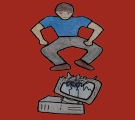
PAC III Computers
617 N Franklin Cuba, MO 65453 573-885-0024
PAC III Computers recommends
NOD32 Anti-Virus
Named the "Best Antivirus Product of 2006" by AV-Comparatives.org
Computer Threats
Most malicious hackers don't care about you, they want your computer.
Why malicious hackers want your computer.
Most malicious hackers don't want your computer to be damaged, they want to use your computer to:
- Relay SPAM e-mail.
- Distribute child porn.
- Distribute miscellaneous porn.
- Attack individuals who cross them.
- Extort money from website owners.
- Brag that they are the better hacker by having the biggest bot net.
They prefer that you not even know that anything is happening at all. If you did you might do something about it.
What to do to protect yourself.
Don't open attachments!
Unless you're expecting it and are absolutely sure it's safe. Over 50% of computer viruses are spread through e-mail. The trickiest part it that most e-mail viruses come from people you know that have your e-mail address. If you get an unexpected e-mail attachment, I suggest that you contact the person that e-mailed the attachment to verify that they meant to send it to you or just delete it if you don't know them. And if you plan to send a safe but suspicious looking attachment, contact the recipient separately.
Beware what websites you go to.
Not all web sites have good intentions. Even some user created pages on legitimate sites like My Space, Yahoo, Blogger, etc. may try to infect your computer, despite their efforts to stop it. Since their networks are so huge, they can't possibly check everything.
Don't download music from P2P programs.
When you download a song from someone on a peer-2-peer network, you are trusting them to give you what you're looking for. Many people post viruses or spyware programs and rename them to look like popular song, picture, or program. When you download it and try to open it you computer is infected.
Be careful where you get free programs.
This goes along with Rule number two, but even if they don't try to infect your computer they may try to offer you a free program. Always be skeptical of people offering free stuff like: neat screen savers, download accelerators, music, porn, etc. Even if it looks like what you wanted it can still be infected. Many Virus writers would prefer that you don't even know anything is wrong.
Don't accept files over chat programs.
Instant messaging programs like, MSN, AOL, IRC, etc. have vulnerabilities that can be exploited before the programs are patched. Even your friends may unknowingly send you a virus because the virus uses the vulnerability to send itself out.
Don't use Internet Explorer, use an alternative browser.
I recommend using the Mozilla Firefox browser,. I suggest at least trying it out, installing it doesn't mean you won't be able to use Internet Explorer if you want or need to. Firefox is also capable of importing Favorites, home page, etc from Internet Explorer.
Always update Windows.
Despite Rumors that some updates can mess up your computer, it is much more important that you fix any vulnerabilities in windows. Almost all update problems are fixed within a few weeks and updates can usually be removed if necessary.
Use an anti-virus and keep it up to date.
It's not enough to just run the anti-Virus, you need to keep it up to date also. An out of date anti-virus can be worse that not anti-virus in that it creates a false sense of security. The most dangerous viruses are the new ones that are a week or two old and an up to date anti-virus is much more well equipped to deal with them
My Favorite Anti-Virus is: NOD32
Use more than one anti-spyware program.
It may sound strange, but one program will almost always find something the other left behind. My Favorites are: SpySweeper, Ad-aware, and Spybot – Search and destroy.
Back up your important files!
I can't stress enough how important this is. If you have critical files on your computer such as financial records, digital pictures, or even just saved games, you'll still be sorry if you lose them.
